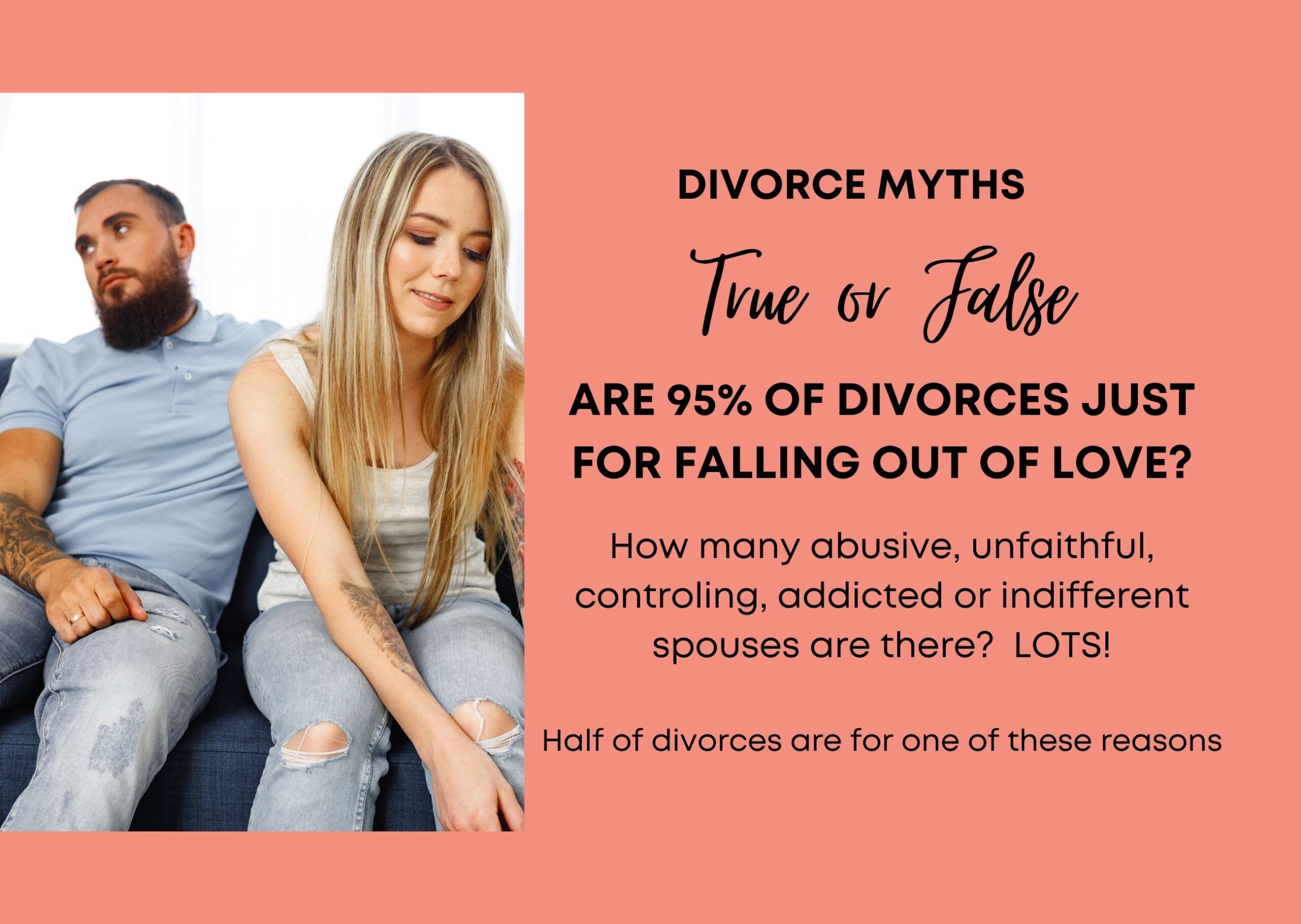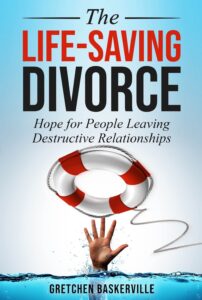NOTE: This is Myth 1 of 27 Myths about divorce that aren’t likely to be true of people who love God and take their faith seriously. These messages make us worry if we’re pleasing God. They contain little accusations that our motives aren’t right. They make us second-guess ourselves when we try to get ourselves and our children to safety. Many of us have heard these messages all our lives and wanted to avoid them. So although these myths may be true for people who are selfish or immature, they aren’t true for a person who invested their heart and soul into the relationship, even when the other person didn’t. See all the myths on one page. See the next myth.
Myth 1: The majority of divorces are for falling out of love.
TRUTH: No. Half of divorces are life-saving.
This myth says that most marriages fall apart because two people just fall out of love. This type of “Hollywood divorce,” is not as common as we were told, according to research. In reality, a large number of divorces happen for life-saving reasons:
-chronic emotional or mental abuse -physical or sexual abuse -addictions -sexual immorality or infidelity -betrayal -criminal activity -incest -financial abuse -spiritual abuse -neglect or abandonment Though some people divorce due to “boredom” or feeling “unfulfilled” or “missing the party life,” many others give very serious reasons for divorce. In fact, nearly half of divorces are for very serious reasons: a pattern of infidelity, sexual immorality, domestic violence, emotional abuse, or drug/alcohol abuse. Here are four studies that show this.
Destructive marriages are more common than we thought.
We weren’t alone. For decades family researchers have wondered the same thing. Why do people divorce? They’ve done a lot of surveys of divorced men and women who reported anonymously.
Here are the four significant surveys.
Survey 1 – In this first survey, the participants had divorced over age 40. Of these, 50% of divorcees mentioned the most significant reason was one of the serious reasons: adultery, sexual immorality, domestic violence, chronic emotional abuse, or abandonment (neglect of duty). [1]
Survey 2 – In this survey of participants age 20- 55, about 42% of divorcees mentioned at least one of the reasons above as the issue that caused the divorce. [2]
Survey 3 – In this study, divorcees could select more than one major contributor to their divorce: 58% of divorcees mentioned infidelity; 30% mentioned domestic violence. (They did not offer drug/alcohol abuse as a choice.) [3]
Survey 4 – In this study, too, participants could select more than one factor in their divorce. Infidelity was a major contributor in 59.6% of divorces, substance abuse in 34.6%, and domestic violence in 23.5%. [4]
About half of divorces are for life-saving reasons.
What this shows is that somewhere between 42% and 59% of divorces are for serious problems. So about half of divorces.
For a long time, we in the church have tended to think about divorce, and about people who have gotten divorced, as though only five percent of those divorces happened for good reason. As you can see from these studies, that’s not true.
There is a lot of bad behavior that makes marriages miserable: unfaithfulness, physical or mental abuse, drug or alcohol abuse, refusing to support the family, or simply walking out the door and never returning.
When the desperate spouse says, “I can’t take any more suffering and betrayal,” we call it a “life-saving” divorce. And only that desperate spouse knows how much they can take. No one else has skin in the game, not the pastor, not their parents, not their friends or people at church.
Those who taught us that 95% of divorces are “frivolous” are simply wrong.
Nearly half of divorces are life-saving divorces.
Footnotes:
[1] Xenia P. Montenegro, “The Divorce Experience: A Study of Divorce at Midlife and Beyond,” AARP the Magazine (May 2004), accessed 1/10/20, https://assets.aarp.org/rgcenter/general/divorce.pdf.
[2] Paul R. Amato and Denise Previti, “People’s Reasons for Divorcing,” Journal of Family Issues 24, no. 5 (July 2003): 602-626.
[3] C. Johnson, S. Stanley, and N. Glenn, et al., “Marriage in Oklahoma: 2001 Oklahoma Baseline Statewide Survey,” (2002): 15.
[4] Shelby B. Scott, Galena K. Rhoades, and Scott M. Stanley, et al., “Reasons for Divorce and Recollections of Premarital Intervention: Implications for Improving Relationship Education,” Couple and Family Psychology: Research and Practice 2, no. 2. (2003): 131-145.
- What is a Life-Saving Divorce? How Do We Know Half of Divorces are “Life-Saving”? (or watch the video)
- Life-Saving Divorce: Introduction What Is this Book About? (audio and transcript)
- About Me: Why Is a Nice Christian Girl Like Me Promoting Divorce?
- How Can I Get the Book, The Life-Saving Divorce? (Amazon affiliate link.) – FREE study guides for each chapter. – FREE videos for each chapter.
- Myth: Divorce is the Unpardonable Sin and “God Hates Divorce”
- Abuse is Biblical Grounds for Divorce
- Malachi 2:16 Haven’t Our English Bibles Always Said, “God hates divorce”? No.
- “But He Never Hit Me”: Divorce for Neglect, Emotional, and Financial Abuse
Physical and Emotional Abuse & Infidelity
- 130 Examples of Abuse: Emotional, Physical, Financial, Spiritual and Gaslighting
- Pastors Who Accept Physical and Emotional Abuse as Grounds for Divorce
- Severe Emotional Neglect: Toni’s Story of Finding Freedom (video)
- 40 Years of Murderous Rages and How I Got Free! Karen’s story (video)
- How Churches Should Handle Abuse Victims (video with Pastor Neil Schori)
- Help! I’m Married to a Cheater: Should I Stay or Go?
- Married to a Pedophile: How I Got Out – Pam’s Story (video)
- Help! I Am Alone with the Abuser
- Jesus’ Greatest Divorce Sermon – Luke 13 (or watch the Video)
- Pastors Who Accept Physical and Emotional Abuse as Grounds for Divorce
- Myth: The Person Who Files for Divorce Caused the Divorce
- Haven’t Our English Bibles Always Said, “God hates divorce”? No.
- Jesus Said, “Love My Enemy”-Can I Still Divorce Them?
- But I Thought it Was God’s Will for Me to Marry this Person!
- Is Pointing Out Marriage-Endangering Sin Being Judgmental? (video)
- One Woman’s Story: Adultery, Prayer and the Bible
- Is Marriage an Unconditional Covenant or a Conditional One? (Video)
- Does Divorce Shatter the Image of Christ and the Church as John Piper Suggests?
- Divorce and the Good Samaritan Story
- Myth: Divorce is the Unpardonable Sin and “God Hates Divorce”
- Myth: Your Divorce Will Shatter the Image of Christ and the Church
- Myth: You Must Forgive and Forget Over and Over, Forever
How to Find a Good Supportive Church
- Pastors Who Accept Physical and Emotional Abuse as Grounds for Divorce
- 7 Ways to Know if a Church is Safe for Abused Wives (or Abused Husbands)
- Do My Pastors Have a Say about Me Getting a Divorce?
- Good vs. Bad Pastoral Counselors on the Topic of Marital Abuse: 40 People Tell their Stories
- 5 Bible Verses that Say You Should Separate from an Abuser
- 1 Million God-honoring Divorcees Cannot Find a Good Church
- Church Denominations and Divorce Policies Comparison Chart
- Excommunication for Getting Divorced? What to Do!
- Evangelicals Shooting their Own Wounded Divorcees (video) or blog/transcript
- How to Handle Criticism When You Divorce (video-3 parts) Natalie Hoffman, Gina Kaye
- Myth: You Don’t Take God-Ordained Marriage Seriously
- Sermon Ideas for Domestic Violence Awareness Month – October
- Churches That Block Abused Wives (and Husbands) From Divorcing
- Southern Baptists make Evangelicalism Unsafe for Abused Wives & Husbands
- How Churches Should Handle Abuse Victims (video with Pastor Neil Schori)
- List of Every Known Puritan Divorce in Massachusetts between 1639 and 1692.
- Your Kids Will Likely Be Fine After Divorce (Nearly 8 in 10 Are!)
- 10 Facts Evangelical Pastors MUST Know about Kids and Divorce [VIDEO]
- There Is No Divorce Crisis. We have a Sin Crisis.
- Myth: 95% of Divorces are for Falling Out of Love
- Will I Ever Find Love Again?
- Dating after Divorce: An interview with Gina Kaye
- I Fear I’ll Never Find a Healthy Relationship
- Remarriage after Divorce: How Can I Claim to be the Innocent Spouse? I Had My Faults Too!
- Will the Kids and I Ever Be Happy Again?
- Happiness Either Way: Remarriage or Staying Single
- Divorce May Improve Your Health: Depression, Suicidal Thoughts and Medical Issues
- How My Health Improved Dramatically After Divorce: Karen’s Story (video)
- “I’m Off of All My Depression Medications Now That I’ve Divorced” Schari’s story (video)
- PTSD, EMDR and My Major Health Improvements after Divorce Toni’s story (video)
- Christians Finding Peace after Divorce: Shirley Fessel, Author (Audio) or (Video)
- 10 Turning Points: Stories of How Others Decided to Stay or to Go
- Married to a Pedophile: How My Kids and I Got Free! (video)
- Finding Joy after a 40-Year Abusive Marriage (video)
- Can I Divorce My Mentally Ill, Destructive Spouse? Yes! Amanda’s Story (video)
- From Bondage to Glorifying God! 5 Survivor Stories (after 20-, 30-, 40-year long abusive marriages)
Self-Doubt, Second-Guessing Ourselves, and Gaslighting
- Am I the One Destroying the Relationship?
- How Can I Call Myself the Innocent Spouse? I Wasn’t Perfect Either (video)
- Is Pointing Out Marriage-Endangering Sin Being Judgmental? (video)
- Myth: He Wouldn’t Cheat or Watch Porn if You Gave Him More Sex
- Myth: You’re Lying: We’d All Know If Your Spouse Was That Bad
- Myth: It Takes “Two to Tango” and “All Marriage Problems are 50/50”
- How to Handle Criticism When You Divorce (video-3 parts) Natalie Hoffman, Gina Kaye
- Is it Best to “Stay for the Kids”? Sometimes, yes. But Not if It’s a Toxic Marriage
- Bad Fathers Are Bad for Kids, Canceling Out the Benefits of a Two-Parent Married Home
- Researchers Know Your Kids Will Likely Be Fine After Life-Saving Divorce
- 5 Studies That Say Your Kids are Likely to Be Okay After Divorce (video)
- Marriage Does Not Guarantee Good Kids: 1 in 10 Kids from Married Two-Parent Homes are Troubled.
- Myth 21: Divorce will Destroy Your Children, So Stay for the Sake of Your Kids
- Research shows: Your Kids Will Likely Be Fine After Divorce: In Fact It’s Best to Divorce to Get Away From Abuse
- 12 Ways to Document and Protect Yourself in a High-Conflict Divorce
- 12 Tips for Talking with Angry, Alienated Kids
- Myth: Divorce will Destroy Your Children, So Stay for the Sake of Your Kids
- Myth: Your Marriage Would Be Great if You Just Submitted More
- Myth: Divorce will Destroy Your Children, So Stay for the Sake of Your Kids
- Myth: Divorce is the Unpardonable Sin and “God Hates Divorce”
- Myth: You Just Didn’t Try Hard Enough
- Myth: You Don’t Take God-Ordained Marriage Seriously
- Myth: Your Divorce Will Shatter the Image of Christ and the Church
- Myth: You Must Forgive and Forget Over and Over, Forever
- Myth: 95% of Divorces are for Falling Out of Love
- 27 Myths about Divorce That Probably Don’t Apply to Committed Christians
- Download “7 Effective Ways to End the Stigma of Divorce in the Church” (Sign up)
- Download “7 Effective Ways to Deal with Criticism when You Divorce” (Sign up)
- Download “3 Studies that Show Kids Are Most Likely to Turn Out Fine After Divorce” (Sign up at bottom of page)
- Home Follow me on Facebook • Follow me on Twitter • Buy the book.
- 10 Key Highlights from the The Life-Saving Divorcebook: 10-minute video overview OR 10 Key highlights blog post
- Request to Join the Life-Saving Divorce Private Facebook Group (Don’t forget to answer the 4 questions)
- Subscribe (FREE) to my You Tube Channel
- About Me Contact
- Gretchen’s Life-Saving Divorce Interviews in the Media


